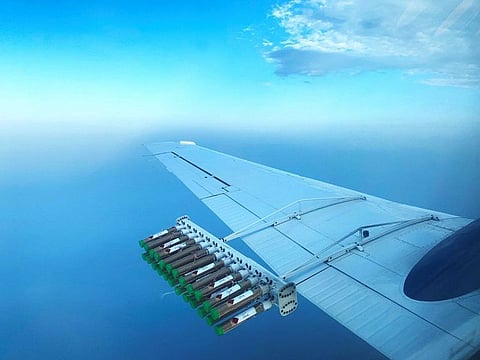How the UAE is using AI for cloud seeding
Since the launch of the national strategy for AI in 2017, environment has been a key focus

Abu Dhabi: The United Arab Emirates is leveraging artificial intelligence (AI) and other advanced technologies to combat the environmental impacts of climate challenges. Through proactive, government-led initiatives, the nation is deploying innovative, AI-driven solutions to safeguard natural resources and curb the effects of climate change.
Since the launch of the UAE National Strategy for Artificial Intelligence in October 2017, the environment has been a key focus. The strategy created a fully integrated digital ecosystem for providing timely, high-quality solutions to pressing challenges.
Here’s a breakdown of the UAE’s ambitious, AI-driven environmental projects:
1. AI-driven initiatives
The Ministry of Climate Change and Environment has pioneered several AI-based initiatives to strengthen sustainability, including:
The AI Lab: Launched in partnership with Khalifa University of Science and Technology and the International Renewable Energy Agency (IRENA), this lab uses AI to:
Map solar energy hotspots.
Monitor and analyse air pollutants across the UAE.
Assess water quality.
Implement real-time solar energy mapping, solar simulation, and environmental monitoring, including real-time prediction systems and marine ecosystem observation.
2. Proactive AI in soil, water, and air monitoring
National and local entities are using science, modern technology, and AI to track changes in soil, water, and air quality and to develop innovative solutions for resource preservation. AI is also being used to:
Transform agriculture and support the UAE’s sustainable food security agenda.
Modernise waste management through recycling initiatives.
Create innovative databases for renewable and long-term environmental solutions.
3. Abu Dhabi Environment Agency (EAD): AI at the core
The Abu Dhabi Environment Agency (EAD) has integrated AI into its core strategy to improve decision-making and develop smarter solutions. Dr. Shaikha Salem Al Dhaheri, EAD Secretary-General, highlighted that three of EAD’s AI-based programs, Coastal and Environmental Rehabilitation, the Green Institutions Network, and the Abu Dhabi Mangroves Initiative, have won awards for sustainability innovation.
Pioneering drone technology: EAD became the first institution worldwide to plant mangroves at scale using drone technology, a highly efficient method.
AI-powered monitoring: EAD has established a wide range of AI-powered monitoring applications, including:
20 air quality stations.
10 marine buoys.
Over 100 groundwater wells with monitoring devices.
Seven wildlife, marine, and bird tracking programs using satellite and GSM platforms.
Data-driven decisions: Through remote sensing, geographic information systems (GIS), and environmental analytics, EAD produces precise datasets to directly support policymakers.
4. The digital state of the environment
EAD launched the world’s first digital State of the Environment Report, powered entirely by AI and using more than 700 indicators. The system:
Predicts six key air quality parameters and three marine water quality indicators for the next five years.
Identifies soil pollutants via drone imagery.
Classifies fish species at fishing ports without human intervention.
Is developing a global-first soil monitoring system using AI, satellite imaging, and drones to map contamination in Abu Dhabi.
5. Tackling the carbon footprint with AI
Several initiatives are leveraging AI to combat climate change, including:
AIOS by MBZUAI: Mohamed bin Zayed University of Artificial Intelligence (MBZUAI) launched AIOS (AI Operating System) to reduce the carbon footprint of AI computing by lowering energy costs, time, and hardware reliance while maintaining performance efficiency.
G42 and NVIDIA: AI and cloud-computing giant G42 partnered with NVIDIA to use the NVIDIA Earth-2 platform for ultra-precise climate and weather forecasts. A new operations center and climate-tech lab in Abu Dhabi will reinforce the UAE’s role in global sustainability innovation.
ADQ and ClimateGPT: ADQ and Swiss firm EQTY Lab launched ClimateGPT, the world’s first open-source, multilingual AI platform to address climate change impacts. Hosted on the Al Dhafra Solar PV plant, the platform is fully renewable-powered and uses over 300 billion climate-related data points to support evidence-based decision-making.
6. Smarter agriculture and food security
AI is helping the UAE improve its agricultural practices and food security:
Smart irrigation: The Ministry of Climate Change and Environment has urged the adoption of AI-powered smart irrigation to support year-round farming. The UAE Development Bank has allocated AED 100 million to finance food security projects.
Boosting efficiency: The Abu Dhabi Agriculture and Food Safety Authority has deployed AI in irrigation systems across 24,000 productive farms, leading to significant crop yields with minimal water use and offering a solution to global water scarcity.
7. AI for forecasting and disaster preparedness
AI applications are transforming climate data analysis and forecasting:
Flood prediction: Google’s research team has developed a global hydrological model that can predict floods up to seven days in advance. Forecasts are available on the Flood Hub platform and integrated into Google Search and Maps SOS alerts, enabling governments to respond faster and mitigate disaster impacts.
8. Broader environmental applications and challenges
AI is being used across multiple environmental domains, including:
Climate change mitigation through predictive modeling.
Sustainable agriculture optimisation.
Ocean health and water resource management.
Accurate weather forecasting.
Disaster response and resilience.
Energy efficiency in buildings.
Smart waste management and recycling.
Air quality and biodiversity monitoring.
Electronic waste hazard detection.
However, challenges remain, such as the high energy demands of AI systems, ethical concerns about data privacy and algorithmic bias. The UAE is positioning itself as a global leader in using AI for climate action and environmental sustainability. By deploying AI across energy, agriculture, biodiversity, and disaster management, the nation is not only mitigating climate challenges but also shaping a smarter, more sustainable future.



